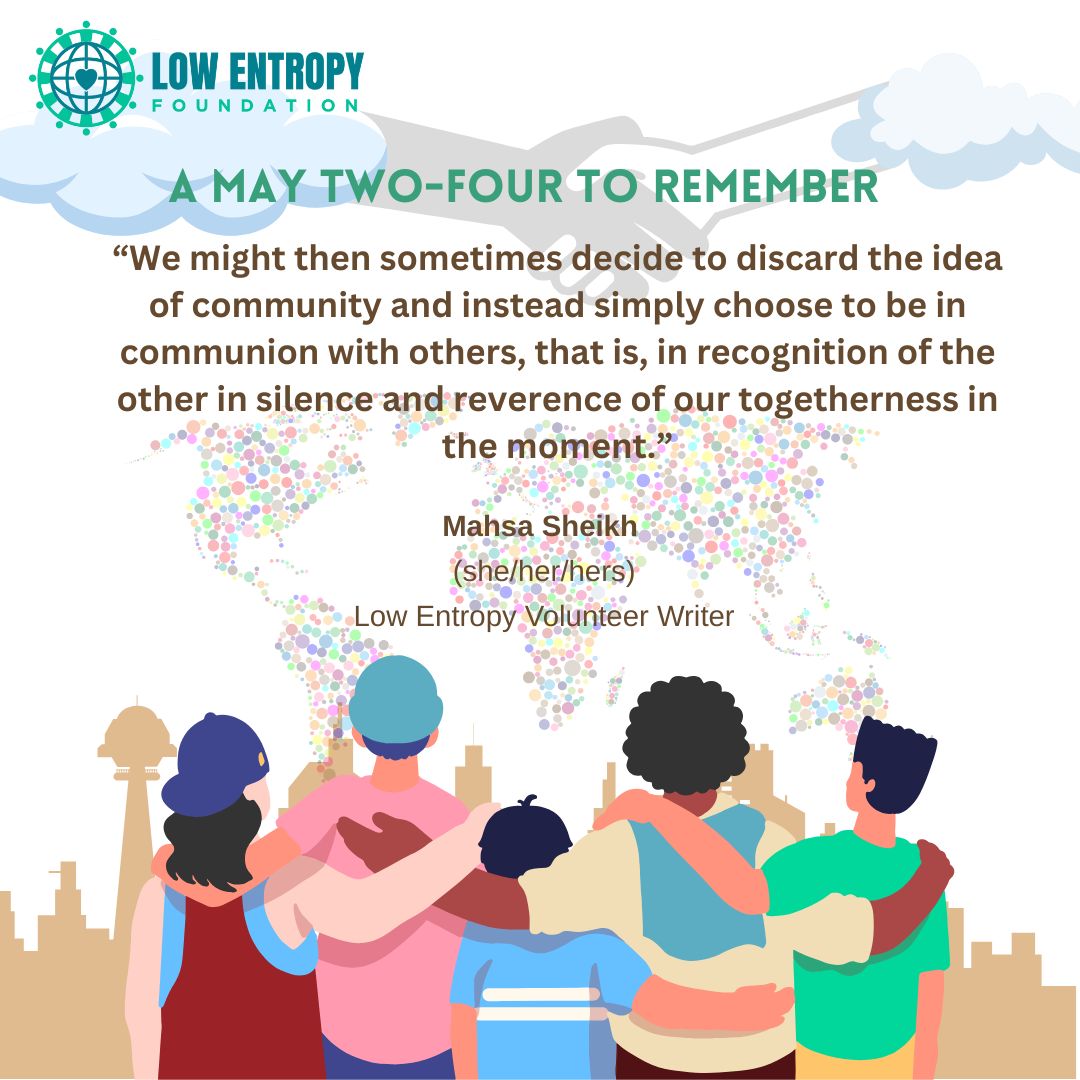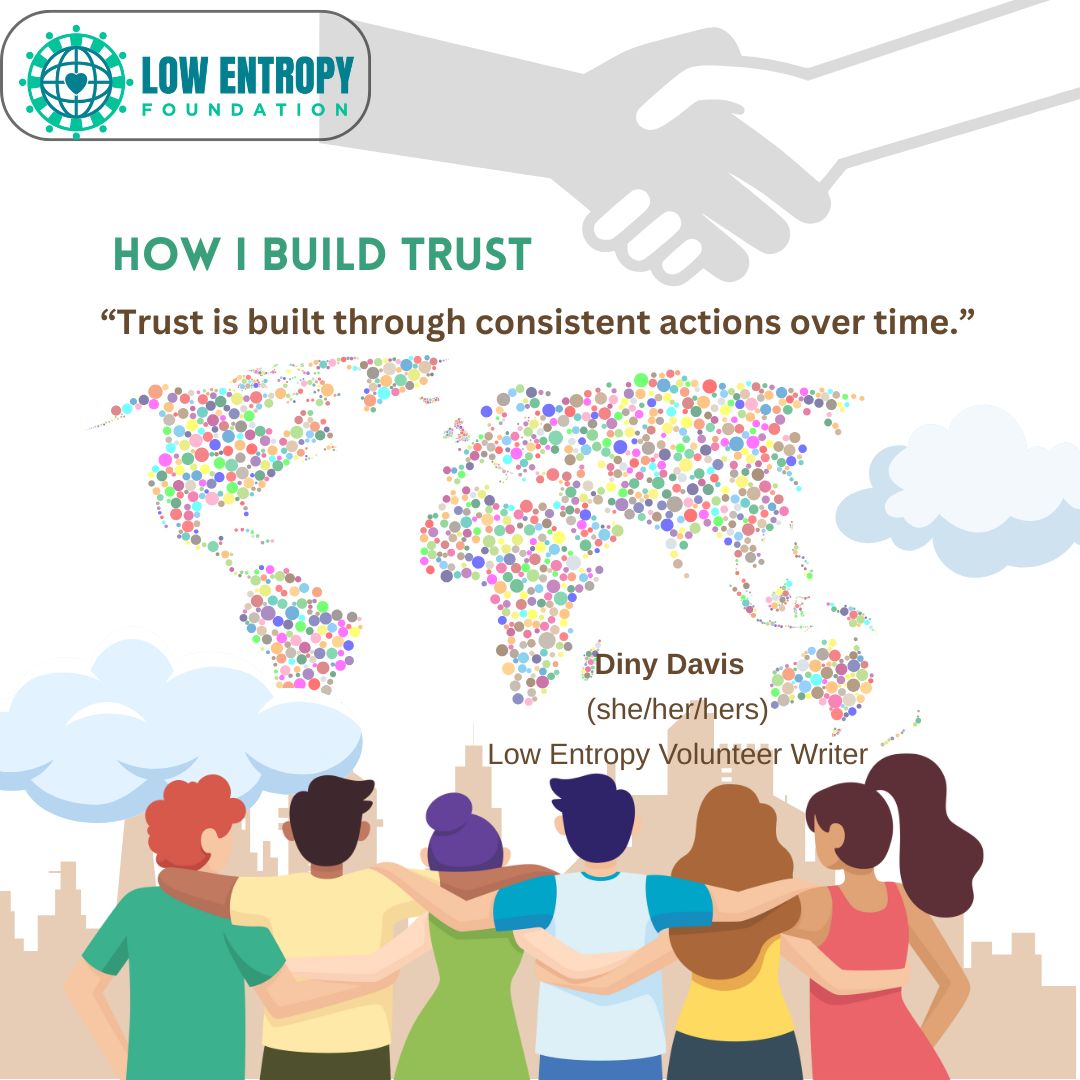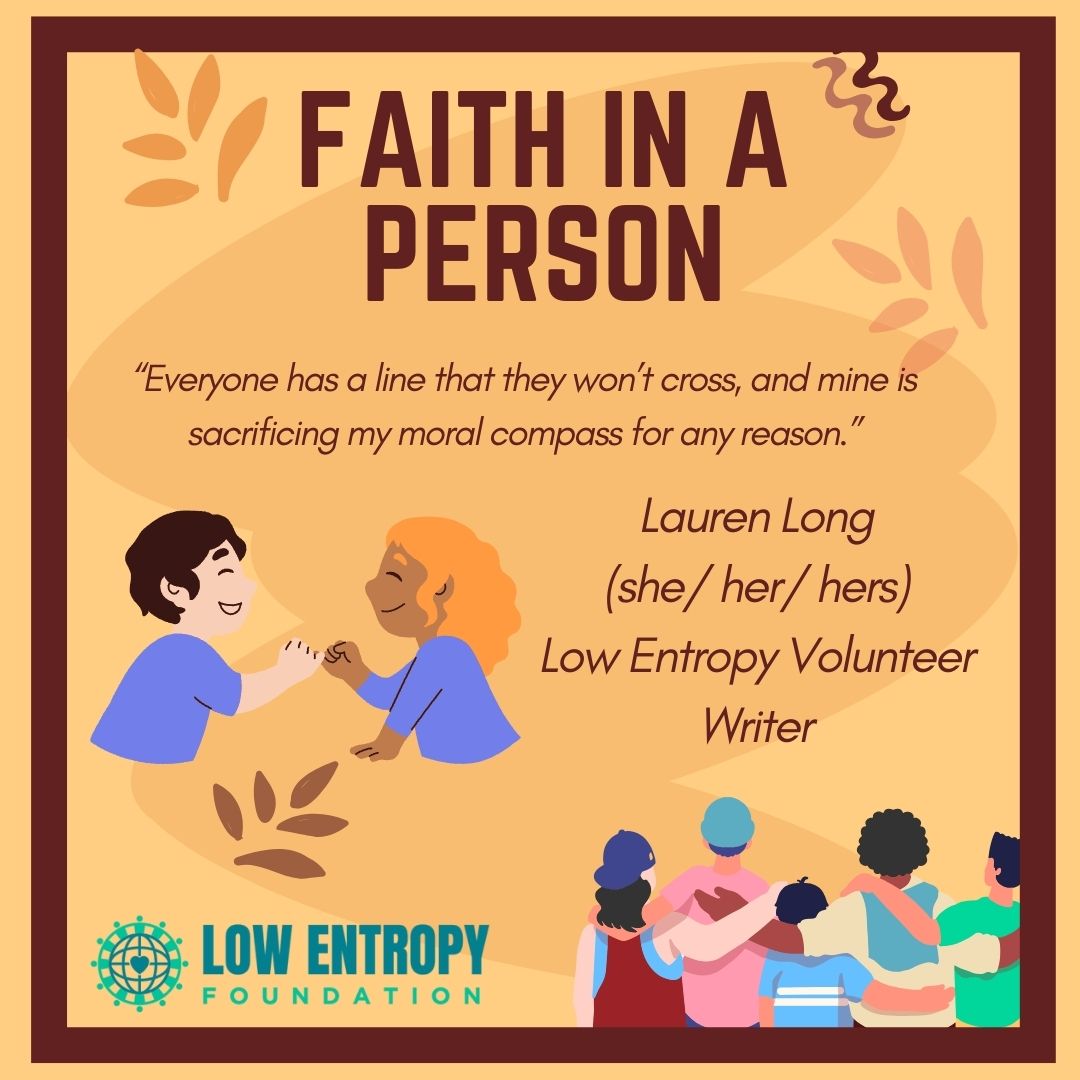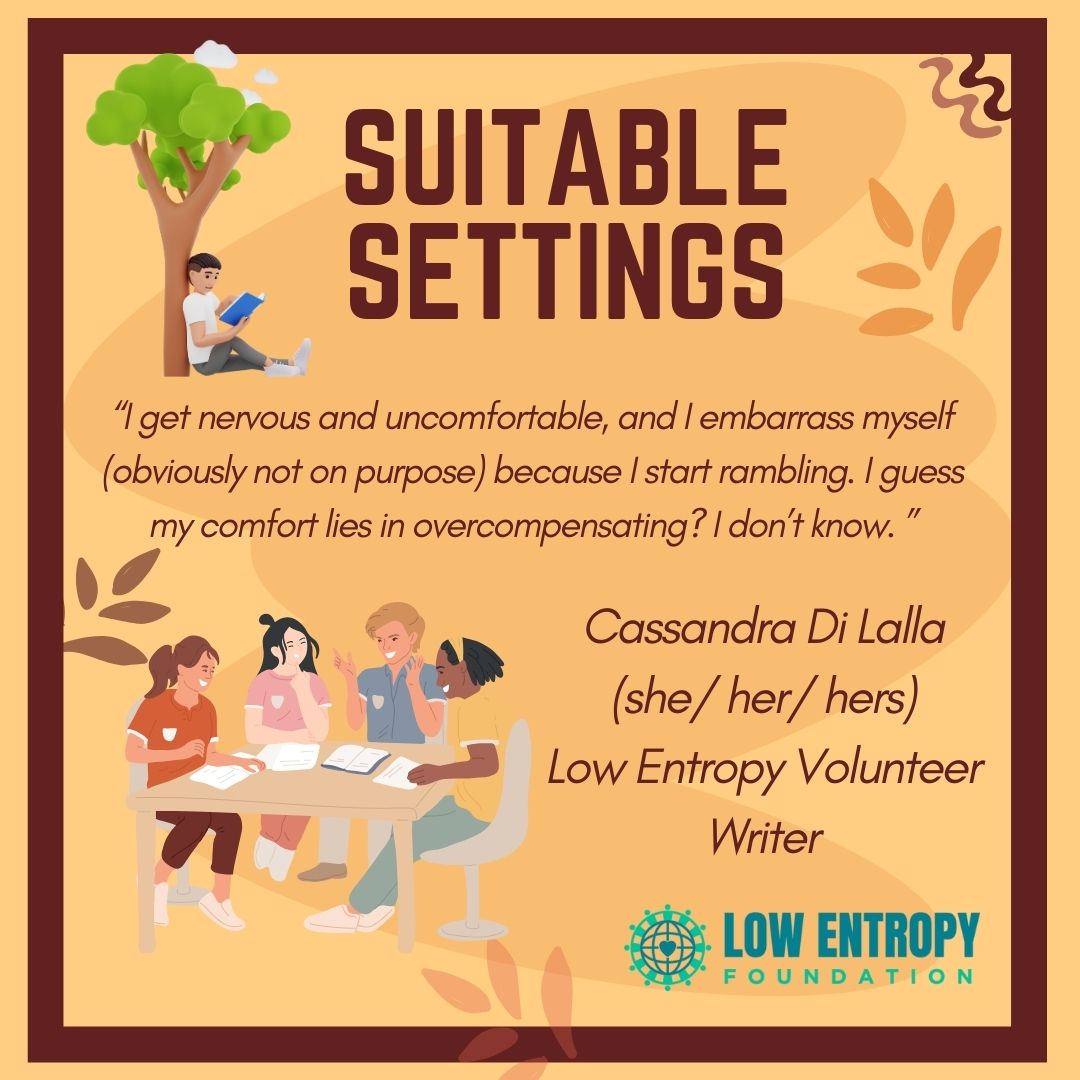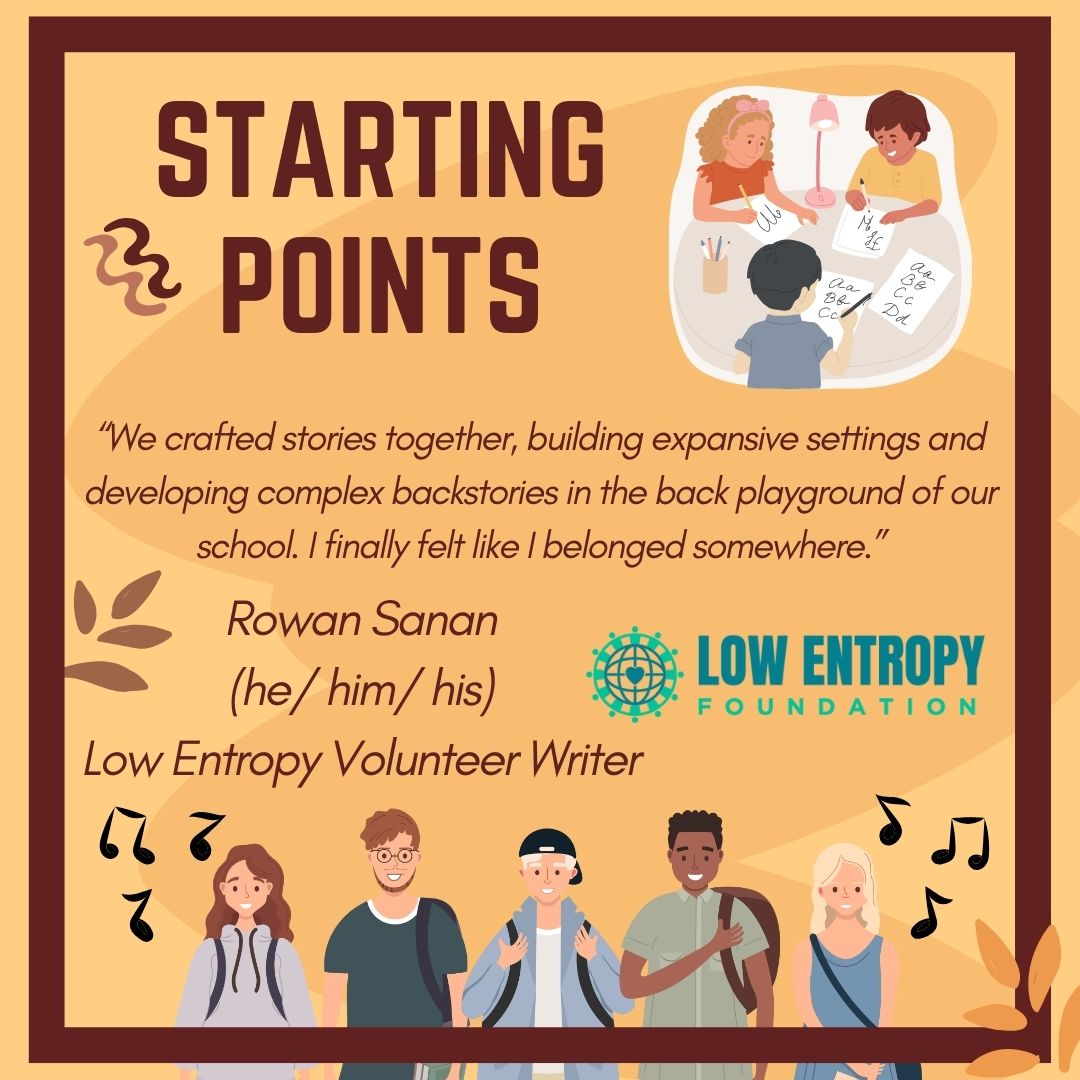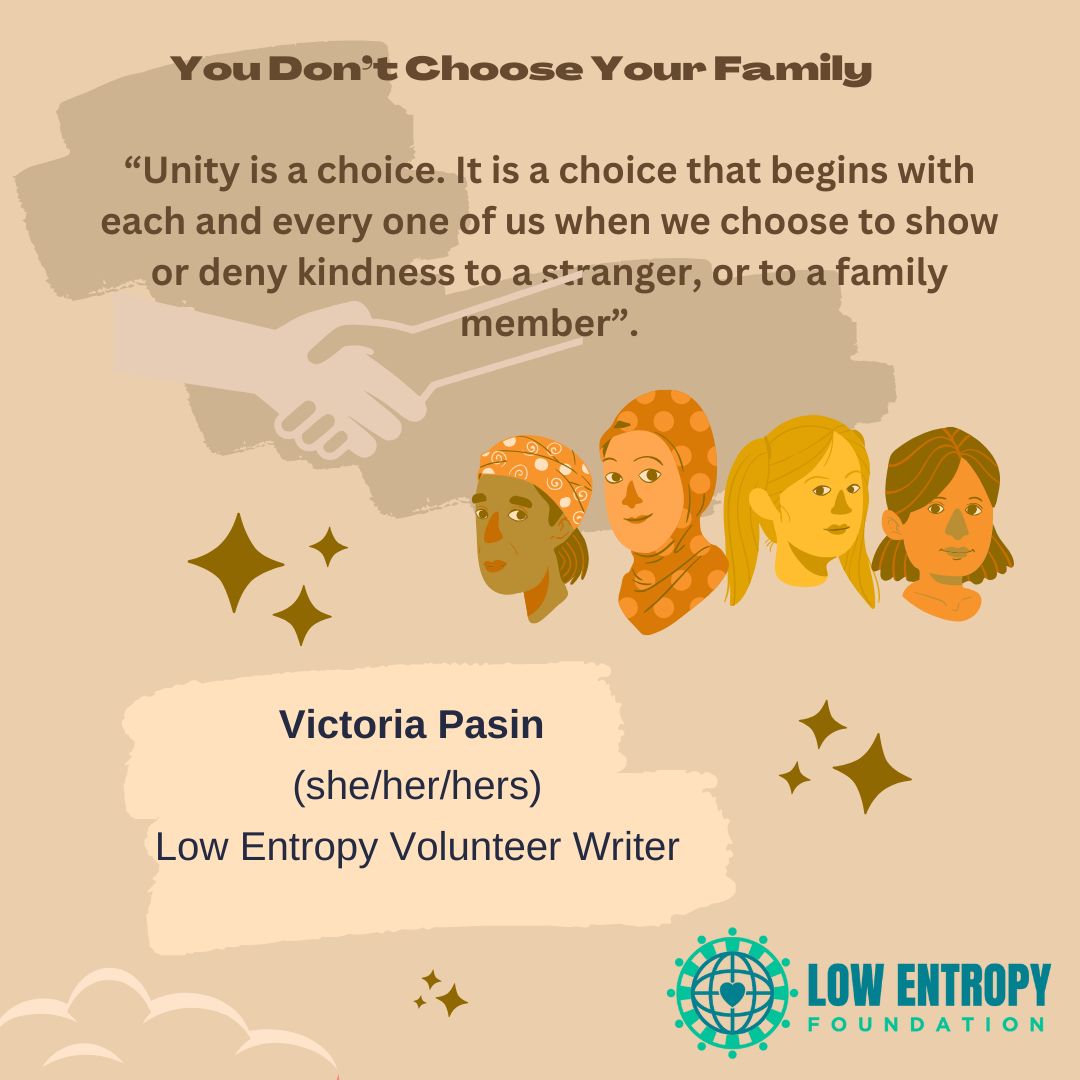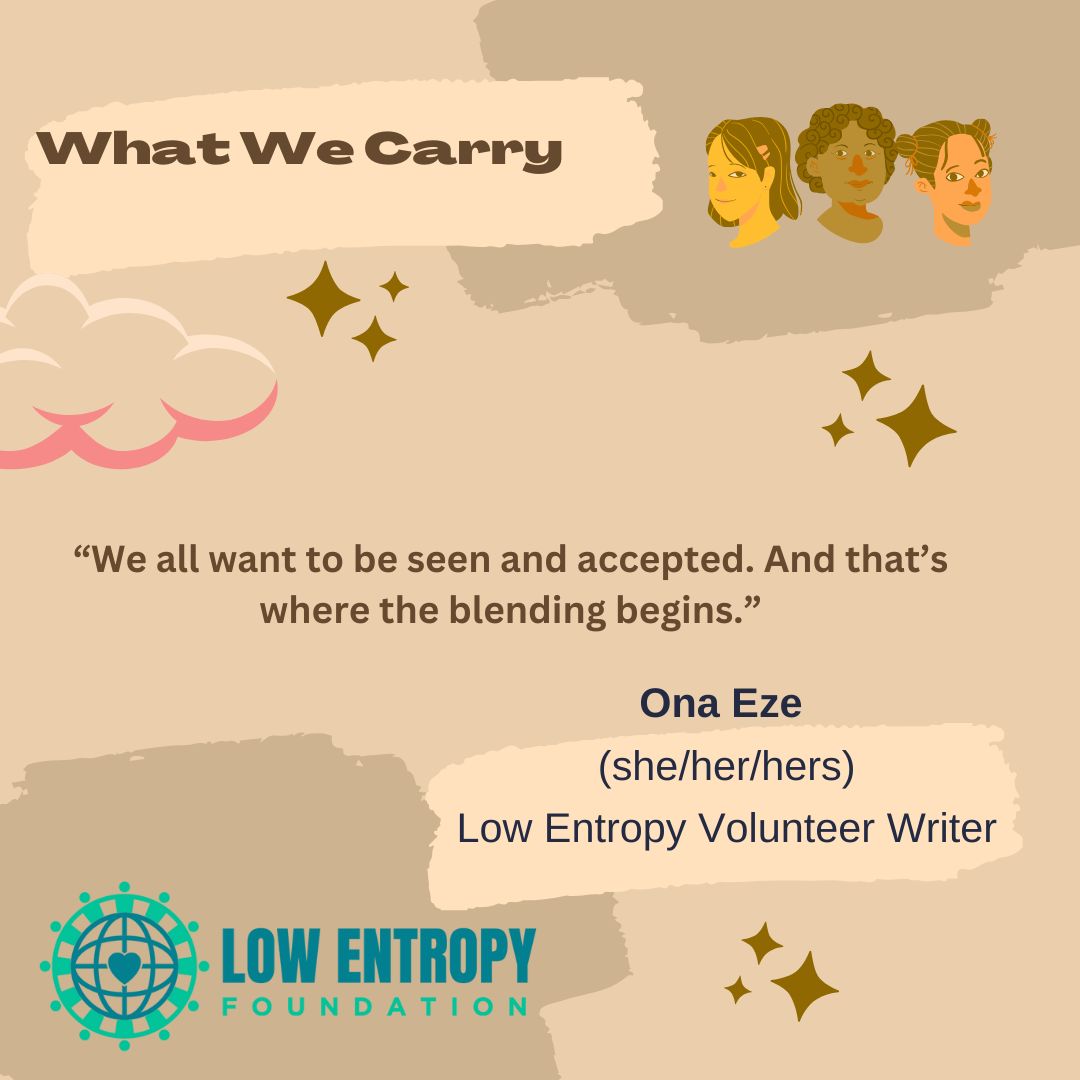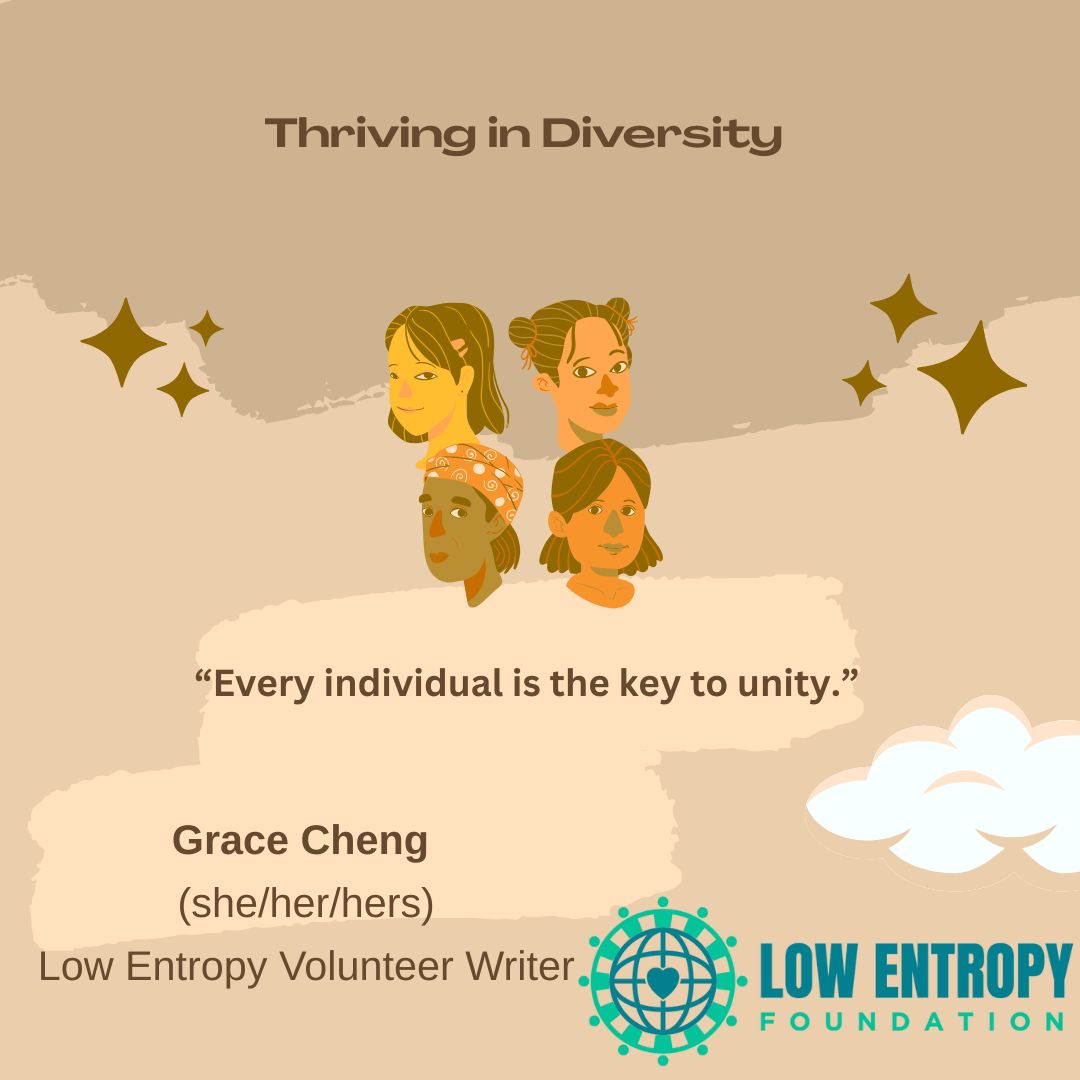Month: July 2025
How I Build Trust
The Unchosen Path: Embracing the Family You Didn’t Pick
Faith in a Person
Lauren Long (she/her/hers), Low Entropy Volunteer Writer
Webster’s dictionary defines trust as a firm belief in the truth of anything, faith in a person, confidence and custody.
I think, when asked, most people would consider themselves trustworthy, but I know quite well that there are individuals who assure others that they can trust them, only to act or speak in ways that betray that statement.
Before I began counselling, I had a lot of trust issues because of the bullying I experienced as a young kid and an adolescent. It’s gotten better, but I don’t let people into my inner circle as easily as I did before.
When it comes to me building trust, I treat others how I want to be treated. My trust has been broken too many times to count, so the last thing I want to do is tell someone that they can trust me and then act in a way that is the total opposite.
One of my close girlfriends, whom I’ve known for over two decades, has told me more than once that I’m one of the few people she trusts wholeheartedly because she’s told me things in confidence that I’ve never repeated to anyone. I’ve never given her a reason to doubt that trust. That wasn’t the case with one of her former friends from high school, who would repeatedly tell her that she wouldn’t say a word, and then my friend would hear from others that this person had repeated what my friend had told her.
When people frequently show us that they cannot be trusted, the best thing we can do is to cut them off for our own peace of mind. The lingering feelings of betrayal and anger can impact our belief in good people and lead us to wonder if we are fated to only cross paths with people who prove themselves to be untrustworthy over and over again.
There are plenty of deceitful people out there, but there are also good people who have integrity and strong moral compasses.
Through my work with The Empowered Pole Dance Project, I have ensured that every dancer who sits down with me knows that they are stepping into a safe space, and that nothing will be published without their final approval.
When I first approach a dancer to ask if they are interested in being a part of the project, I share the project’s focus with them and what they can expect from me. After sending them the questions for the interview, I make a point of staying in touch with them, asking if there’s anything they need from me or if they need any help.
While The Empowered Pole Dance Project isn’t an official organization and my blog and podcast aren’t a business, that doesn’t mean I don’t treat them like one. The Empowered Pole Dance Project played a large part in helping me build my reputation, and I did it while sticking to my morals and beliefs.
The stories I write for the project or share in video interviews on my podcast are people’s lives, and the dancers I work with deserve to know that, in addition to paying great attention to detail, I will treat them and their stories with the integrity, kindness, respect and dignity they deserve. They’re trusting me to tell their stories in a way that showcases their authenticity, as well as giving them the chance to express their voices in a safe space, free from judgment and shame.
The biggest component of the trust-building part of the partnerships between the dancers I interview and me is the importance of consent. I make that clear from the get-go. When I send out the welcome email/package to the dancers, the very first thing I mention is that I uphold the value of consent. If I tell the dancers nothing will be published without their final approval or that I will accommodate if they want something changed or removed altogether, I keep my word. They’re opening up to me, someone whom they have only met online, and trusting me to treat them and their stories with dignity and honour. I have never wanted to be one of the Rita Skeeters of the world, and I never will be. I have no respect for people who publish or circulate untruthful stories through word of mouth.
I believe that trust, honesty and loyalty are the most important virtues and character traits someone can have, and I’ve turned down jobs that required me to go against my ethics and beliefs. Everyone has a line that they won’t cross, and mine is sacrificing my moral compass for any reason. If we set aside our ethics once, it becomes easy to do so again until we become someone we don’t recognize, and nothing is worth that.
—
Born and raised in Quesnel, BC, Lauren Long is a strong advocate for mental health and well-being, as well as being a major Swiftie and a role model for positive body image. She believes in the value of truth and that truth matters. When she’s not writing, you can find her on the pole, on the training mats or curled up with a good book.
Suitable Settings
Cassandra Di Lalla (she/her/hers), Low Entropy Volunteer Writer
It’s always an interesting experience for me to find my tribe, because friendships aren’t the easiest for me. I have social anxiety and I’m absolutely terrible in a large crowd or any type of social setting, really. I get nervous and uncomfortable, and I embarrass myself (obviously not on purpose) because I start rambling. I guess my comfort lies in overcompensating?! I don’t know. It’s just difficult for me.
It isn’t a simple “one and done” process for me to be able to find people with similar interests, because personality is a big thing for me as well. I need to make sure that it will feel natural and not forced when conversing with someone, especially if I’m trying to figure out what their personality’s like and vice-versa.
I have a minuscule circle of friends, but I like it that way, because again—it’s a comfort thing for me.
A few of my favourite pastimes are as follows: laundry, knitting, reading, writing, spending time with my pets (or being around animals in general), volunteering (but not just anywhere), learning new things, taking part in health and wellness webinars, thrifting, etc . . . I know there are many people out there who share these similar interests; however, I’m a homebody so it’s a bit of a challenge trying to figure out where I’d feel welcome and most at ease while doing the things I love, and sharing those moments with people that enjoy those same hobbies.
I hate to admit this, but my generation is very much dependent on video games, the internet, social media, etc . . . rather than being one with the trees or just out in nature. I’m somewhat guilty of that. I’m often on my phone watching inspirational videos or searching courses of interest, reading a book outside in my backyard or focusing on personal writing projects.
I find that, in this day and age, social media is the most appropriate tool to use in order to find out about events or activities. You’ll see posts about a book club or what’s happening at local community centres, vendor markets and farmers’ markets, art shows, conventions (such as Anime North, Comic Con, or even health and wellness shows) and so on. We’re so dependent on social media because we’re able to reach a very large audience or find a specific community of people/population that have those same hobbies in common.
There are cafes where people go to play video games, board games, and have food and drinks, and some of them even host tournaments. There are platforms such as Twitch where you can livestream video gaming, broadcasting, creative content, etc . . .
For me personally, I love libraries, bookstores and community book sales. The library’s nice and quiet, which allows you to do your reading, writing, homework, research and whatever else in peace. Oh, and puzzles! My local library changes up their puzzle whenever the current one’s completed—anybody can jump in and have a go! Not only do you have the freedom to borrow books, but you can also borrow CDs, DVDs, puzzles, crafts/other activities, board games and some other cool items. The bookstore’s magical because if you’d rather purchase a book or anything else to call your own, then voilà—it’s yours to keep and you don’t have to worry about returning it to the library. I appreciate community book sales because 99% of the time, the book sales’ profits support churches, community centres, animal shelters or other charities. So not only are the prices reasonable, but you’re also helping out tremendously.
Animal shelters are some of my favourite places to be. It breaks my heart, seeing all of these fur friends needing a home filled with love, care, compassion and safety. But my heart feels whole when I’m able to offer them all of my love when I go and visit. The most difficult thing at the end of all of this is when it’s time to leave. I feel this immense guilt when I see the sadness in their eyes, and then I feel as though I’m abandoning them. It’s heart-wrenching. I wish I could bring them all home, because they all deserve a safe haven . . . serenity . . . comfort. I have two dogs and a cat at home so my hands are tied, but my heart is just so full of love to give, so I try to donate whenever I can even though I’m already in a tough spot financially. It’s so rewarding to know that my donations make a difference, and it’s a nice feeling to know that the outpouring of my love and care filled their day with a little sunshine.
The world is made up of different people with different personalities and varying interests—that’s completely okay and it keeps life interesting. Sometimes I’ll go and see what’s out there, but most times I’ll be at home, and that’s okay too.
Whenever you find a suitable setting, whether it’s a cafe of some sort or even a group where you feel at home—just embrace it and enjoy your time.
—
Cassandra Di Lalla lives life purposefully. She enjoys reading, writing and mental health initiatives. She’s an animal lover for life and an innovative individual always finding new ways to create.
Starting Points
Rowan Sanan (he/him/his), Low Entropy Volunteer Writer
Ever since I was a kid, I’ve had a hard time making friends.
Even when I was young, outgoing and hyper, I only ever had about three close friends, and I don’t even remember how I became friends with them. It could have been because we met at school and eventually started developing interests in different hobbies, some of which ended up being in common.
When I got a little bit older and moved away from my childhood home, I no longer had consistent contact with those friends. I entered a new school and realized I had nothing in common with any of my classmates, and that made me extremely anxious. I became a recluse, not speaking to anyone unless spoken to, and struggling to find myself in a school that seemed to not want me there. I quickly realized I needed to leave that place and find somewhere I felt right.
I was lucky in that new school, thankfully, despite my new quiet and shy energy. One of my closest friends to this day was a new kid just like me, and we hit it off and became inseparable very quickly. We soon became a trio with another friend, and the thing that bonded us together like glue was writing. We’d all dabbled in writing geeky sci-fi or fantasy fiction for years before we met each other, but we finally had other people to bounce ideas off of. We crafted stories together, building expansive settings and developing complex backstories in the back playground of our school. I finally felt like I belonged somewhere.
When I went off to high school, I was terrified. I’d been separated from my closest friends, since I chose to go to another school that had a fine arts program I wanted to take. I still remember the racing of my heart on my first day of orientation. Then, I heard a new classmate talking about a book I liked at the time during a class discussion. I knew that was my chance, so I found her after class and gathered up all the courage I could manage. I genuinely felt like I was going to pass out, but I was able to speak to her. I’m very glad I did. She and another classmate she was speaking with became some of the only friends I’d make through high school.
In university now, I find myself extremely lucky to be attending a music program where everyone around me has a common passion and interest. While I still get extremely anxious whenever I speak to anyone, it helps to know that I don’t need to find a specific niche to tie myself down to, because we all at least enjoy the same thing. Still, the friends that I have become closest to share other hobbies and interests with me, like video gaming.
Now, to give reason to this giant ramble about my childhood and life: if it hadn’t been for the hobbies I had that were once considered geeky or strange, I might not have made any of the friends I still hold dear to this day. Even now, we have discovered new hobbies and interests to bond over that we all enjoy, like Dungeons & Dragons, board games and more. It’s hard to stay close to everyone now that we’re all spread out across different schools and cities, and we don’t know everything that is going on in each other’s lives anymore. Still, there’s a sense of community that grows when you discover something in common with the people you care about. It’s one of the things that keeps people from drifting apart as they get older. Many adults choose to start or join hobby groups to maintain or discover friendships. Teens and young adults sometimes find online communities where they can work on their virtual hobbies in collaboration with others.
Hobbies provide perfect starting points for people to bond, discuss their strategies or ideas and grow closer together. These starting points become all the more important the older we get, with a society around us that pushes long workdays on us and takes the free time we have to spend with friends. Hobbies create safe spaces for people to come together, which can improve people’s moods and outlooks on life, especially if that hobby is considered geeky or different. As the world around us gets more and more uncertain, the only things we know will stay with us are the bonds we create with others that we choose to uphold and develop throughout our lives.
Starting those bonds often seems daunting, so why not start with a fun hobby?
—
Rowan is a university student who loves to write books and poetry, read all kinds of books and spend time with his family and pets.
You Don’t Choose Your Family
Victoria Pasin, Low Entropy Volunteer Writer
I was born to two bleeding-heart liberal parents. Both, especially my dad, have always described themselves as stereotypically progressive. My dad’s two brothers, that is, my uncles, are the polar opposite. All three brothers maintain a significant interest in Canadian and American politics, and are careful to keep up with all possible news outlets.
For years, I, as well as my entire family, have grown extremely accustomed to loud arguments, with debates lasting throughout the evening, particularly throughout elections, as well as assorted scandals, and major policy wins and losses. Both of my uncles are proud supporters of generally conservative ideals. Whenever major decisions are made, or a politician gives a major address, or has a major meeting, the phone starts ringing. As long as news is breaking, at least one of the three has an opinion, and another will have a response. However, for all their differences of beliefs, there is never a lack of respect.
Although a phone call may start with passionate political discourse, it never ends in bitterness. Politics is a conversation starter, rather than a divisor. That is a deliberate choice. In a world in which politics has divided so many families, the three brothers refuse to allow it to divide them. This doesn’t mean that they hold back in their arguments. If anything, it means the opposite. It means that, when they do argue, they refuse to truly demean each other’s characters. They may banter for hours on end, but they all know that they will never stop having each other’s backs in times of crisis.
Last August, my paternal grandmother, their mother, suffered a stroke due to a complication after a major surgery. Although this event was undoubtedly tragic, it has been beautiful to watch my dad and his siblings quickly coordinate to ensure that she is rarely alone after finally leaving the hospital. Whether it is one of them, or my cousins and I, she is taken care of. In the midst of this catastrophe, it is never a hardship for them to collaborate in order to create a schedule for basic things, such as installing safety equipment and meal planning for my grandmother. This support also extends to times of great celebration, such as when one of my uncles recently found out that he was becoming a grandfather in a few short months. My dad was his first call to announce the news.
Can a person’s political allegiance compromise their moral character? It certainly can. However, there is a difference between a person with a compromised character and a person with a differing political opinion. My uncles are pillars of their community. Both are extremely close to their family. One in particular volunteers often with youth sports, and holds a minor position in his municipal government. They are respectful and kind at family functions. Why should politics be a source of disharmony within our familial community?
With as much division in the world as there is, I’ve always believed that this mutual respect is the foundation of any attempt at peace on this earth. It is a universal truth that it is impossible for any group of people to agree completely on virtually anything. Through their boisterous banter, my family has taught me that attacking someone’s character, rather than their logic, is a sure way to get oneself nowhere.
I have heard countless people, be they friends, family, or teachers, despair due to a lack of unity amongst the global community. I feel that something is always left out of the discussion, on the topic of world peace and global cooperation. Unity is a choice. It is a choice that begins with each and every one of us when we choose to show or deny kindness to a stranger, or to a family member.
We do not choose our family. Rather, we are stuck with one particular couple of parents, and if we’re lucky, grandparents, uncles, aunts and cousins, by accident of birth. Whether we like it or not, these people gradually shape our worldview. Whether we like it or not, it is impossible to achieve peace on a grander scale if it is not achieved at the smallest scale of individuals going about their lives.
My thesis is simple. The beginning of any sort of unity and peace in the world begins with each person choosing kindness with those that they are closest to. It is easy to be kind to those we agree with. It is often most difficult to show that same kindness to a person with a different worldview. Therefore, I issue the challenge to be kind and pursue a relationship with someone who possesses an opposing worldview. Embrace discomfort. It certainly will widen one’s horizons.
—
Leave your thoughts for Victoria in the comments below. You can also follow us on Facebook, Instagram, TikTok, LinkedIn and YouTube to stay up-to-date with Low Entropy news!
What We Carry
Ona Eze (she/her/hers), Low Entropy Volunteer Writer
Unity can feel like a big word. A heavy word. But the more I think about it, the more I realize—it’s not about all of us being the same. It’s about learning how to move together, live together and hold space for one another, even when we come from very different places.
For me, unity looks like what happens when cultures come together—not to compete or dominate, but to blend. To listen. To learn. To share. When we open ourselves up to that, we’re creating something powerful. Not perfect, but meaningful.
Culture Isn’t Just What We See—It’s What We Carry
Culture is more than clothes or cuisine or music—though those are beautiful parts of it. Culture is in how we greet our elders, how we mourn, how we celebrate, how we gather around a meal or honour a promise. It’s how we were raised, what we believe and what feels like home.
And yet, even with all our differences, there’s a common thread—we’re all looking for belonging. We all want to be seen and accepted. And that’s where the blending begins. When we make room for each other’s customs, languages, ways of thinking, we don’t lose ourselves—we expand. We grow.
I’ve had moments where I’ve been invited into someone’s cultural experience, whether it was through food, prayer, dance or simply conversation. And I’ve seen what happens when people lean in with curiosity, not judgment. Something shifts. A wall comes down. A connection is formed.
Unity Isn’t Passive—It’s Intentional
Blending cultures isn’t always easy. It takes effort. It takes listening more than we speak. It takes unlearning. Sometimes it even takes a little discomfort—being okay with not knowing the “right” thing to say or do, but still showing up with respect.
Unity is not about pretending differences don’t exist. It’s about saying, I see you. I might not fully understand, but I want to. It’s asking questions and being open to the answers. It’s realizing that what’s unfamiliar isn’t threatening—it’s just new. And it might even become something beautiful in our lives if we allow it.
The Real-Life Moments That Stay with You
I remember being at an event where people from so many different backgrounds brought dishes from their cultures. A woman shared a story about how her grandmother taught her to make a certain dish during the war, and someone else from a totally different country said, “My grandmother said the same thing.” Different continents. Same warmth.
That’s the kind of unity I believe in—one that doesn’t erase difference, but sees the humanity in it. Because at the end of the day, we all have stories. We all come from somewhere. And when we share those stories—whether through food, art, language or presence—we’re weaving something stronger.
Don’t Mistake Unity for Conformity
Sometimes people think blending cultures means giving up who you are to “fit in.” That’s not unity—that’s shrinking. That’s erasure. Real unity means you bring your whole self, I bring mine and we find ways to honour both.
It also means being honest about the systems that make some voices louder and others quieter. Unity means making room. It means stepping back when needed and making sure everyone feels safe, seen and heard.
A Blend, Not a Blur
To me, blending cultures is like mixing colours. When done with care, the new shades created aren’t muddy—they’re rich. Deep. Unexpected in the best way. Unity isn’t about blurring everything into one grey space. It’s about bold colours standing side by side, learning how to complement and respect each other.
We are stronger together. Not because we’re the same, but because we’ve chosen to walk together in the middle of our differences.
And that? That’s what unity feels like to me. A shared table. A conversation. A willingness to learn, to try and to show up. Again and again.
—
Onachukwu (Ona) Eze is a purpose-driven professional with a global mindset and a passion for people. Born in Lagos, Nigeria, she grew up in a creative and professional household that sparked her love for storytelling, learning and meaningful work. Whether she’s leading inclusive hiring strategies or building systems that support people and performance, Ona brings heart, clarity and results. Outside of work, she thrives on cultural exploration, community connection and uncovering what makes organizations and people grow.
Thriving in Diversity
Grace Cheng (she/her/hers), Low Entropy Volunteer Writer
Technological progress, international conflicts and social upheavals in today’s world have made it more important than ever for humanity to unite. Within the immense diversity of cultures, faiths and beliefs, there remains a universal longing for connection, understanding and a sense of purpose among all human beings. To foster a more compassionate and resilient global community, it is crucial to build unity among people worldwide. In this article, we examine practical approaches and philosophical insights that can help us bridge rifts and foster genuine solidarity.
Embracing our Shared Humanity
Everyone needs safety, love and a sense of belonging, no matter where they come from or what they believe. The recognition of these universal necessities cultivates empathy and reduces bias.
Education plays a crucial role in fostering this awareness. Early exposure to world history, cultural diversity and human rights can foster understanding and compassion. Intercultural interaction and dialogue programs allow individuals to experience different perspectives firsthand, eliminating stereotypes.
Communicate in a Clear, Respectful Manner
Ineffective communication often results in conflicts and misunderstandings. Promoting open, honest and respectful conversations can help bring people together. Developing these skills requires active listening, empathizing with others without rushing to judgment, and expressing oneself with kindness and sincerity.
The digital age has provided us with unprecedented opportunities to connect across borders through social media. However, if misused, it can also deepen divisions. Diverse voices can be appreciated and heard in virtual communities that promote digital literacy and encourage respectful online exchanges.
Bringing conflicting groups together through community forums and intercultural dialogue initiatives is one of the most effective means of building bridges. Finding common ground is easier when individuals feel genuinely understood.
A Shared Vision and Set of Principles
The pursuits of happiness and justice are shared objectives among all of humanity. Unifying these ideals can create a sense of belonging.
The global issues of climate change, health crises, poverty and conflict require collective responses. The recognition of our mutual dependencies and shared responsibilities can motivate us to act cooperatively. Organizations like the United Nations show how we can collaborate on common goals, offering a model for local and individual efforts.
Promoting local projects that address immediate needs while contributing to broader global goals can foster a sense of shared purpose within a community. We can reinforce the idea of unity by celebrating stories of collaboration and solidarity.
Appreciating and Exchanging Cultures
Festivals, artistic collaborations and student exchanges facilitate cross-cultural interactions, which enable people to appreciate and understand different traditions. By engaging with other cultures through music, cuisine, art or language, people develop respect and curiosity, instead of suspicion.
Diversity and acceptance can be built by supporting events and platforms that highlight diverse voices. Culture-specific media can foster empathy and understanding by presenting cultures accurately and positively.
Cultural differences can also be used to strengthen, rather than divide societies if societal perspectives are shifted toward embracing diversity. Society becomes more innovative and adaptable when it embraces diversity.
Incorporating Equity and Inclusion into Institutions
Institutions like governments, schools and workplaces shape our attitudes and behaviors as a society. By promoting equality, justice and participation within them, all voices are heard.
By addressing systemic inequalities and ensuring equal opportunities, social divides can be reduced in diversity-driven organizations and collaborative environments.
An education system that encourages critical thinking and multicultural awareness prepares individuals to thrive in a diverse world. By embracing principles of fairness and inclusion, institutions contribute to societal cohesion.
Promoting Compassion and Growth
Every individual is the key to unity. Empathy, humility and openness are qualities that contribute significantly to social harmony.
Being compassionate by being understanding and empathetic can lead to the transformation of relationships and communities. Kindness, volunteering and engagement with diverse groups foster a sense of responsibility.
The role of leadership is also crucial. Leaders who show integrity, humility and commitment to the common good inspire others to follow suit. Personal accountability and kindness ripple outward, inspiring societal improvement.
Utilizing Technology and Education
The advancement of education and digital technology creates unprecedented opportunities for connecting people across borders. The use of online learning platforms enables knowledge to be accessed globally, promoting the understanding of cultures across the globe.
Virtual collaboration tools allow diverse individuals to work with humanization of global issues and an emphasis on cooperation are emphasized in these narratives work toward common goals, allowing trust to be built and collective efforts to be demonstrated. Social media campaigns, podcasts and documentaries can inspire hope and motivate action.
Resolving Obstacles to Unity
Despite these strategies, prejudice, economic inequality, political unrest and misinformation continue to make it difficult for people to work together. The solution to these challenges requires persistent effort and a systemic approach.
By promoting economic fairness, disparities that often fuel resentment can be reduced. Through media literacy and responsible journalism, people can distinguish truth from falsehood and combat misinformation.
Reconciliation and dialogue initiatives are essential for resolving conflicts rooted in history. The foundation of a cohesive society lies in building trust and encouraging forgiveness.
Shared Visions and Hope
The cultivation of hope is also vital. There have been numerous crises in the past, and humanity has shown resilience and ingenuity. Individuals and communities can work together to achieve a more compassionate, just and sustainable world by sharing a common vision.
Human rights, environmental stewardship and social justice movements drive global movements toward unity. To make positive changes, people must believe in their own potential.
Humanity is brought together through continuous efforts on a personal, community and institutional level. The journey begins with recognizing our shared humanity, fostering effective dialogue, celebrating cultural diversity, and aligning around common values and objectives. Forging connections can be accomplished through empathy, inclusive policies, technology and confronting obstacles.
The road to unity is paved with understanding, kindness and a shared purpose. The collective human spirit and our innate capacity for connection provide hope in the face of ongoing challenges. By working together, we can build a world where everyone feels valued and connected rooted in respect, cooperation and love.
—
Grace has an accounting and finance background. She enjoys reading, writing, listening to music, watching movies and playing sports.







